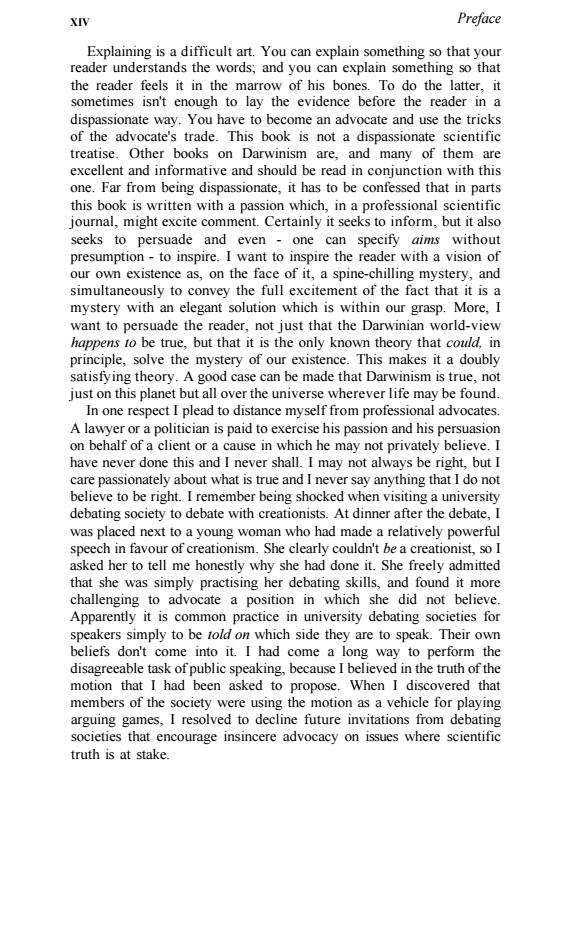正在加载图片...

XIV Preface Explaining is a difficult art.You can explain something so that your reader understands the words;and you can explain something so that the reader feels it in the marrow of his bones.To do the latter,it sometimes isn't enough to lay the evidence before the reader in a dispassionate way.You have to become an advocate and use the tricks of the advocate's trade.This book is not a dispassionate scientific treatise.Other books on Darwinism are,and many of them are excellent and informative and should be read in conjunction with this one.Far from being dispassionate,it has to be confessed that in parts this book is written with a passion which,in a professional scientific journal,might excite comment.Certainly it seeks to inform,but it also seeks to persuade and even one can specify aims without presumption-to inspire.I want to inspire the reader with a vision of our own existence as,on the face of it,a spine-chilling mystery,and simultaneously to convey the full excitement of the fact that it is a mystery with an elegant solution which is within our grasp.More,I want to persuade the reader,not just that the Darwinian world-view happens to be true,but that it is the only known theory that could,in principle,solve the mystery of our existence.This makes it a doubly satisfying theory.A good case can be made that Darwinism is true,not just on this planet but all over the universe wherever life may be found. In one respect I plead to distance myself from professional advocates. A lawyer or a politician is paid to exercise his passion and his persuasion on behalf of a client or a cause in which he may not privately believe.I have never done this and I never shall.I may not always be right,but I care passionately about what is true and I never say anything that I do not believe to be right.I remember being shocked when visiting a university debating society to debate with creationists.At dinner after the debate,I was placed next to a young woman who had made a relatively powerful speech in favour of creationism.She clearly couldn't be a creationist,so I asked her to tell me honestly why she had done it.She freely admitted that she was simply practising her debating skills,and found it more challenging to advocate a position in which she did not believe. Apparently it is common practice in university debating societies for speakers simply to be told on which side they are to speak.Their own beliefs don't come into it.I had come a long way to perform the disagreeable task of public speaking,because I believed in the truth of the motion that I had been asked to propose.When I discovered that members of the society were using the motion as a vehicle for playing arguing games,I resolved to decline future invitations from debating societies that encourage insincere advocacy on issues where scientific truth is at stake.XIV Preface Explaining is a difficult art. You can explain something so that your reader understands the words; and you can explain something so that the reader feels it in the marrow of his bones. To do the latter, it sometimes isn't enough to lay the evidence before the reader in a dispassionate way. You have to become an advocate and use the tricks of the advocate's trade. This book is not a dispassionate scientific treatise. Other books on Darwinism are, and many of them are excellent and informative and should be read in conjunction with this one. Far from being dispassionate, it has to be confessed that in parts this book is written with a passion which, in a professional scientific journal, might excite comment. Certainly it seeks to inform, but it also seeks to persuade and even - one can specify aims without presumption - to inspire. I want to inspire the reader with a vision of our own existence as, on the face of it, a spine-chilling mystery, and simultaneously to convey the full excitement of the fact that it is a mystery with an elegant solution which is within our grasp. More, I want to persuade the reader, not just that the Darwinian world-view happens to be true, but that it is the only known theory that could, in principle, solve the mystery of our existence. This makes it a doubly satisfying theory. A good case can be made that Darwinism is true, not just on this planet but all over the universe wherever life may be found. In one respect I plead to distance myself from professional advocates. A lawyer or a politician is paid to exercise his passion and his persuasion on behalf of a client or a cause in which he may not privately believe. I have never done this and I never shall. I may not always be right, but I care passionately about what is true and I never say anything that I do not believe to be right. I remember being shocked when visiting a university debating society to debate with creationists. At dinner after the debate, I was placed next to a young woman who had made a relatively powerful speech in favour of creationism. She clearly couldn't be a creationist, so I asked her to tell me honestly why she had done it. She freely admitted that she was simply practising her debating skills, and found it more challenging to advocate a position in which she did not believe. Apparently it is common practice in university debating societies for speakers simply to be told on which side they are to speak. Their own beliefs don't come into it. I had come a long way to perform the disagreeable task of public speaking, because I believed in the truth of the motion that I had been asked to propose. When I discovered that members of the society were using the motion as a vehicle for playing arguing games, I resolved to decline future invitations from debating societies that encourage insincere advocacy on issues where scientific truth is at stake